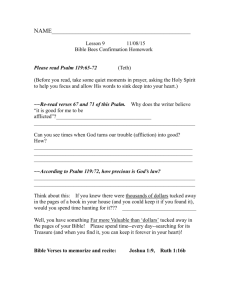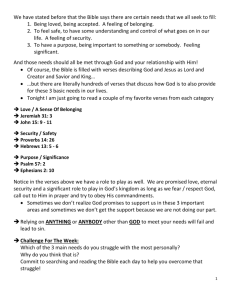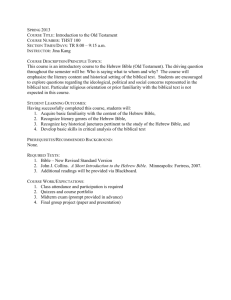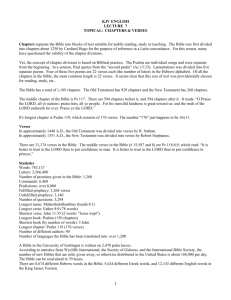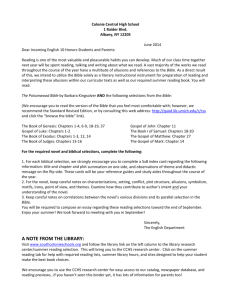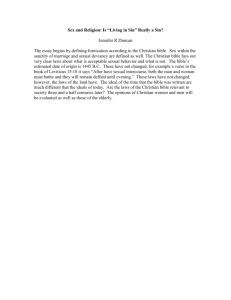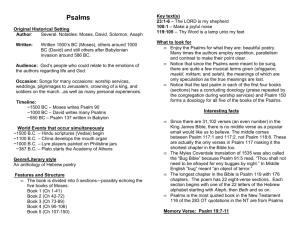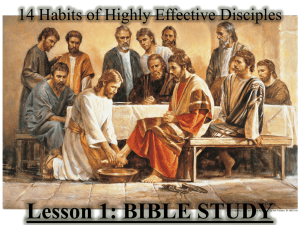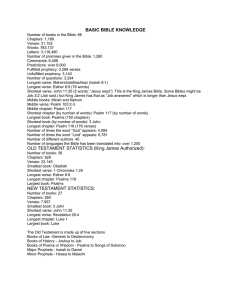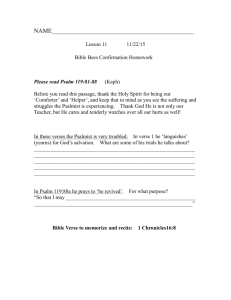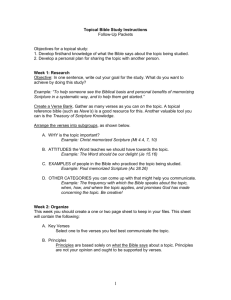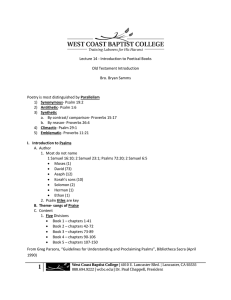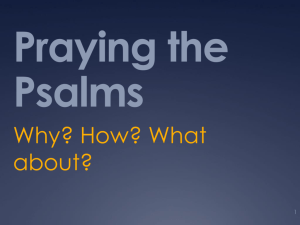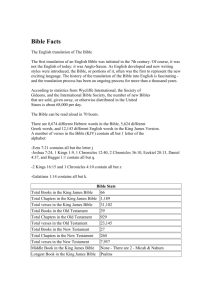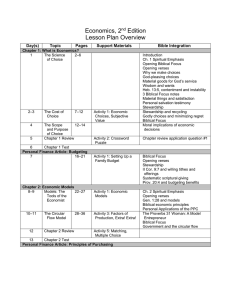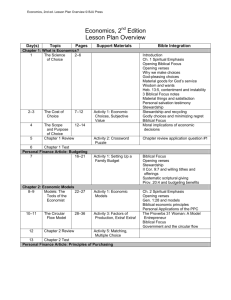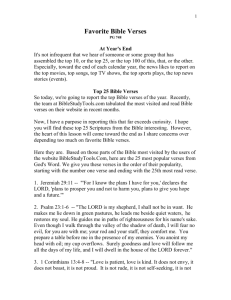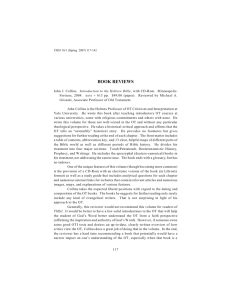The Most Important Parts for Literature Students
advertisement
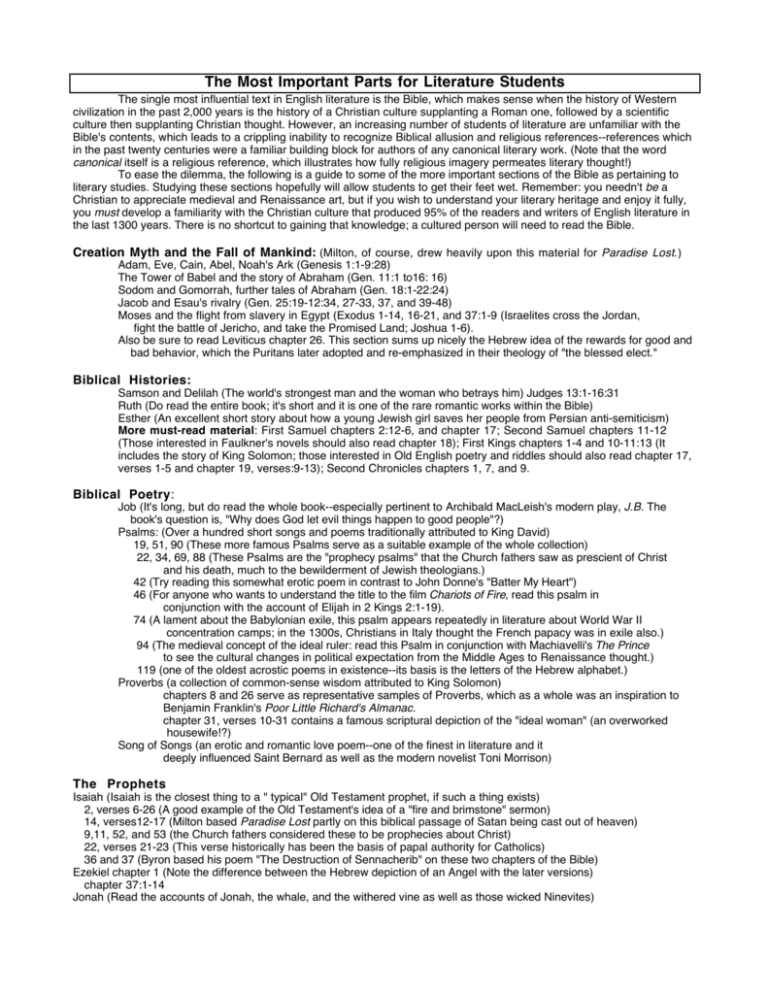
The Most Important Parts for Literature Students The single most influential text in English literature is the Bible, which makes sense when the history of Western civilization in the past 2,000 years is the history of a Christian culture supplanting a Roman one, followed by a scientific culture then supplanting Christian thought. However, an increasing number of students of literature are unfamiliar with the Bible's contents, which leads to a crippling inability to recognize Biblical allusion and religious references--references which in the past twenty centuries were a familiar building block for authors of any canonical literary work. (Note that the word canonical itself is a religious reference, which illustrates how fully religious imagery permeates literary thought!) To ease the dilemma, the following is a guide to some of the more important sections of the Bible as pertaining to literary studies. Studying these sections hopefully will allow students to get their feet wet. Remember: you needn't be a Christian to appreciate medieval and Renaissance art, but if you wish to understand your literary heritage and enjoy it fully, you must develop a familiarity with the Christian culture that produced 95% of the readers and writers of English literature in the last 1300 years. There is no shortcut to gaining that knowledge; a cultured person will need to read the Bible. Creation Myth and the Fall of Mankind: (Milton, of course, drew heavily upon this material for Paradise Lost.) Adam, Eve, Cain, Abel, Noah's Ark (Genesis 1:1-9:28) The Tower of Babel and the story of Abraham (Gen. 11:1 to16: 16) Sodom and Gomorrah, further tales of Abraham (Gen. 18:1-22:24) Jacob and Esau's rivalry (Gen. 25:19-12:34, 27-33, 37, and 39-48) Moses and the flight from slavery in Egypt (Exodus 1-14, 16-21, and 37:1-9 (Israelites cross the Jordan, fight the battle of Jericho, and take the Promised Land; Joshua 1-6). Also be sure to read Leviticus chapter 26. This section sums up nicely the Hebrew idea of the rewards for good and bad behavior, which the Puritans later adopted and re-emphasized in their theology of "the blessed elect." Biblical Histories: Samson and Delilah (The world's strongest man and the woman who betrays him) Judges 13:1-16:31 Ruth (Do read the entire book; it's short and it is one of the rare romantic works within the Bible) Esther (An excellent short story about how a young Jewish girl saves her people from Persian anti-semiticism) More must-read material: First Samuel chapters 2:12-6, and chapter 17; Second Samuel chapters 11-12 (Those interested in Faulkner's novels should also read chapter 18); First Kings chapters 1-4 and 10-11:13 (It includes the story of King Solomon; those interested in Old English poetry and riddles should also read chapter 17, verses 1-5 and chapter 19, verses:9-13); Second Chronicles chapters 1, 7, and 9. Biblical Poetry: Job (It's long, but do read the whole book--especially pertinent to Archibald MacLeish's modern play, J.B. The book's question is, "Why does God let evil things happen to good people"?) Psalms: (Over a hundred short songs and poems traditionally attributed to King David) 19, 51, 90 (These more famous Psalms serve as a suitable example of the whole collection) 22, 34, 69, 88 (These Psalms are the "prophecy psalms" that the Church fathers saw as prescient of Christ and his death, much to the bewilderment of Jewish theologians.) 42 (Try reading this somewhat erotic poem in contrast to John Donne's "Batter My Heart") 46 (For anyone who wants to understand the title to the film Chariots of Fire, read this psalm in conjunction with the account of Elijah in 2 Kings 2:1-19). 74 (A lament about the Babylonian exile, this psalm appears repeatedly in literature about World War II concentration camps; in the 1300s, Christians in Italy thought the French papacy was in exile also.) 94 (The medieval concept of the ideal ruler: read this Psalm in conjunction with Machiavelli's The Prince to see the cultural changes in political expectation from the Middle Ages to Renaissance thought.) 119 (one of the oldest acrostic poems in existence--its basis is the letters of the Hebrew alphabet.) Proverbs (a collection of common-sense wisdom attributed to King Solomon) chapters 8 and 26 serve as representative samples of Proverbs, which as a whole was an inspiration to Benjamin Franklin's Poor Little Richard's Almanac. chapter 31, verses 10-31 contains a famous scriptural depiction of the "ideal woman" (an overworked housewife!?) Song of Songs (an erotic and romantic love poem--one of the finest in literature and it deeply influenced Saint Bernard as well as the modern novelist Toni Morrison) The Prophets Isaiah (Isaiah is the closest thing to a " typical" Old Testament prophet, if such a thing exists) 2, verses 6-26 (A good example of the Old Testament's idea of a "fire and brimstone" sermon) 14, verses12-17 (Milton based Paradise Lost partly on this biblical passage of Satan being cast out of heaven) 9,11, 52, and 53 (the Church fathers considered these to be prophecies about Christ) 22, verses 21-23 (This verse historically has been the basis of papal authority for Catholics) 36 and 37 (Byron based his poem "The Destruction of Sennacherib" on these two chapters of the Bible) Ezekiel chapter 1 (Note the difference between the Hebrew depiction of an Angel with the later versions) chapter 37:1-14 Jonah (Read the accounts of Jonah, the whale, and the withered vine as well as those wicked Ninevites)
